- Home
- Troy Denning
Last Light Page 7
Last Light Read online
Page 7
But that did not mean he would tolerate a de facto invasion of his homeworld.
Research battalion or not, the 717th had strong-armed President Aponte into granting permission for its occupation of the Montero Vitality Center, and Gao’s honor demanded a response. Arlo just had to do it without starting a war—at least not one that could be traced back to Gao. Fortunately, he had the perfect plan.
Thirty seconds into the video, a pair of patrol craft sprouted pinpoints of light and curled toward the center of the screen. They quickly expanded into thumb-size dots, then swelled into the fast-growing halos of spacecraft accelerating on an interception vector. The stars in the background curved into streaks as the photographer’s vessel turned away, then the image blurred and winked out altogether.
The blank screen dissolved into a real-time vid of local space. The orange crescent of Gao’s star, Cordoba, could be seen intruding along the left edge of the display. Hanging next to it was Gao itself, a mottled green disk fading to desert gray at both poles. Arlo studied the scene from the flag chair at the head of the conference table, gathering his thoughts as he watched Gao’s three moons chase each other over the horizon. Finally, he turned to the woman seated to his left.
“I hope your camera crew survived,” he said. “The UNSC can be so touchy about surveillance.”
Reza Linberk gave him a wide, close-lipped smile. “How kind of you to worry, Minister Casille,” she said. With long silvery hair, well-defined features, and ice-blue eyes, Linberk was gorgeous but unappealing—at least to Arlo, who preferred his companions to be warm and saucy, rather than enchanting and ruthless. “You’re going to be a very beloved president.”
“Let’s not get ahead of ourselves,” Arlo said, waving off the flattery. “The important thing here is to be certain the UNSC doesn’t see an opportunity in President Aponte’s cowardice. Whether I end up replacing him or not remains to be seen.”
“Not at all,” Linberk said. “You’re the only prospect who brings an alliance with Venezia. Peter wanted me to assure you of that.”
“That means a great deal to me, of course,” Arlo said. Peter being Peter Moritz, the public face of the Venezian Militia. “His support will be invaluable when I’m forced to call for elections.”
“You also have the support of the Keepers of the One Freedom,” added the cabin’s third occupant, a gray-bearded Jiralhanae chieftain named Castor. So huge he had to sit on a tool locker brought up from the Esmeralda’s repair shop, the Jiralhanae reminded Arlo of the great gray apes that ruled Gao’s polar barrens. The chieftain spoke through a translation disk that hung around his thick neck. “Your foes will cower before our fellowship.”
“I’m grateful, Dokab,” Arlo said. He was careful to use Castor’s title as a cult elder and address him using a tone of the utmost respect, for the Jiralhanae was the key to Arlo’s plan. “But I hope you won’t judge the people of Gao by our current elected leader. We don’t usually cower before anyone.”
“Certainly not in my experience,” Linberk said smoothly. “But your president’s caution is creating problems for Venezia, too. It’s not good to have a UNSC task force lurking between our two systems. Normal traffic is giving a wide berth to the entire region.”
“And their infidel presence is an insult to the One Freedom,” Castor added. “Believers fear defilement.”
Normal traffic, Arlo realized, was Linberk’s reference to the smugglers and pirates who operated out of Venezia. He was less certain of what Castor was alluding to, but Arlo understood that the Keepers of the One Freedom were devoted to spreading the worship of their Forerunner deities across the galaxy. Based in the Venezian capital of New Tyne, the Keepers welcomed believers of all species—even humans, as long as they swore opposition to the “heretic tyranny” of the Unified Earth Government. The sect was growing so swiftly in the Outer Colonies that they were drawing off UNSC intelligence assets, and that fact alone had been reason enough for Arlo to start funneling money and weapons into their organization.
Arlo made a show of considering their complaints for a few moments, then leaned forward to brace his elbows on the table.
“I’m sorry President Aponte has brought this trouble on you,” he said. “But I’m confident we can correct the situation—if we all work together.”
This brought a smile to Linberk’s lips. “So, you asked us here because you’re ready to move forward?”
“Assuming we can agree on a plan,” Arlo said. He had always found it more effective to allow his instruments—especially Jiralhanae instruments—to think they were telling him what they wanted to do. He turned to Castor. “First, Dokab, I need to consult your expertise regarding the Forerunners. This is from a report I received earlier today.”
Arlo placed his datapad on the table and selected the recording of that afternoon’s discussion with Inspector Veta Lopis. He had removed irrelevant office talk and the confidential details of the investigation, but had otherwise left it intact. He pressed play, and Veta’s voice came from the tiny speaker.
“I don’t have much time,” the inspector said. “There’s a new crime scene, and we’re heading back into the caves.”
“Any suspects yet?” Arlo had asked.
“Only Spartans stand out,” Lopis said. “These killings take a lot of physical power. The victims have been crushed, sometimes literally torn apart. I think there’s a lot of rage and loss of control.”
“Loss of control?” Arlo echoed. “That doesn’t sound like a Spartan. From what I hear, they’re all about focus and control.”
“That bothers me, too,” Lopis said. “I’m trying to expand the suspect pool, but there are security issues. Commander Nelson did admit that the Spartans are here to fight something called Sentinels. They claim the Sentinels can’t be our prime suspect because they attack only with particle beams, but I haven’t been able to verify that.”
“Sentinels?” Arlo repeated. “I think you just confirmed a suspicion for me. Did they happen to say anything about the Forerunners?”
“Not to me, but I saw Commander Nelson use the term when he was dressing down one of the Spartans.” Lopis paused, then said, “Arlo, there’s too much going on here for it to be coincidence. The Montero quake and the miracle cures have something to do with Forerunners. And whatever that connection is—that’s what brought the UNSC here.”
“No need to be diplomatic, Veta,” Arlo said. “You can say it—that’s what the UNSC came to steal from Gao.”
“I couldn’t prove that, but if that’s truly what this is all about, I’ll admit it’s hard to see the UNSC leaving behind any kind of Forerunner medical technology.” Lopis paused a moment, then added, “And I might have a lead on its name. Have you ever heard of something called an ‘ancilla’?”
There were two seconds of silence.
“Minister?”
“Sorry, Veta,” Arlo answered. “I have no idea what that could be. But I do know a little something about Sentinels . . . and if you’re right about all this, please be careful. They’re dangerous.”
“You think maybe?” Lopis’s tone was sarcastic. “I was already assuming that because of the Spartans’ presence.”
“Sorry,” Arlo said. “Sentinels are a type of Forerunner drone. I’ll try to have specs before your next report.”
“Thanks,” Lopis said. “And see what you can get on Mjolnir armor, too.”
“As in Spartan Mjolnir armor? I’m not sure my sources will have access to that—or be willing to part with it if they do. Sharing tidbits on the Forerunners is one thing—selling out the Spartans is in a whole different class of danger.”
“So offer more, or blackmail them,” Lopis demanded. “But if our prime suspect does turn out to be a Spartan, I’m going to need a way to get past the armor. . . .”
Arlo stopped the playback. Though it would have been poor operational security to admit it to a field agent, he knew exactly what an ancilla was, and he wanted to see Castor’s reaction to
news that the UNSC was currently stalking one.
The Jiralhanae braced his hands on the table and rose, hunching over with his head and massive shoulders pressed against the cabin’s low ceiling. His eyes were wide, and his fangs were bared in a gaping expression that seemed more surprised than angry.
“Ancilla?” Castor in disbelief. “Did she say ancilla?”
“Perhaps.” Arlo was careful to keep his tone neutral. “That’s certainly what it sounded like.”
“Then they have found one of the Oracles?”
“It could be.” Arlo was puzzled by Castor’s lack of outrage; surely, the Jiralhanae would consider the ancilla a sacred object. “That’s what I wanted to consult with you about.”
“The Oracles speak for the gods.” Castor was starting to talk faster and louder, his voice rumbling out of his translator disk in deep, distorted tones. “For the heretics to take one is—”
“I doubt they’ve actually captured it,” Linberk interrupted. “It seems to me that a Forerunner ancilla would be the objective of an operation like this. If the UNSC had it already, wouldn’t they be gone by now?”
“I agree,” Arlo said. He was not surprised by how quickly Linberk was picking up on his plan. She was the smartest person he knew, and the only opponent who regularly beat him at both backgammon and go. “The research battalion wouldn’t be here if they had the Oracle.”
“There you have it, then.” Linberk locked gazes with Arlo and cocked her brow, letting him know she expected to be compensated for her support. “The Spartans are here because the UNSC wants the ancilla.”
Still, Castor failed to erupt as Arlo had expected. The Jiralhanae merely sank back down onto the tool locker. He stared at the opposite wall for a time, then finally shook his head.
“It cannot be permitted. Not ever.” Castor looked to Arlo. “The Keepers will trade.”
“Trade?” Arlo was beginning to worry he had underestimated the Jiralhanae—and no one ever made that particular mistake twice. “I’m sorry, but we’re talking about Spartans here. My agent couldn’t possibly steal the ancilla—”
“I will trade you,” Castor interrupted, “for access. Get my warriors to the caverns, and I will give you the Mjolnir specifications that your spy needs. I will give you schematics.”
“You have Mjolnir armor schematics?” Arlo asked. “How on Gao did you come by those?”
Castor straightened his spine, raising his head so high that his bristly hair brushed the ceiling. “I was an army chieftain during the war,” he said. “I captured many useful things.”
Arlo drew back, only half-pretending to be intimidated. “I see,” he said. “And how many warriors of yours are we talking about?”
“Five hundred,” Castor replied without hesitation. “I have five hundred holy warriors berthed aboard the One Light.”
“You brought a Keeper strike force into Gao orbit?” Arlo didn’t know whether to feel worried or impressed. “Without asking?”
“You said to come at once.” Castor spread his huge hands and grinned. “It was only wise to arrive prepared.”
“Indeed it was,” Linberk said quickly. “But will five hundred warriors be enough? Once this starts, there won’t be any reinforcements. We won’t be able to get them through that UNSC task force out there.”
“Five hundred is enough,” Castor replied. “Most will be Jiralhanae. And I will lead them myself.”
Arlo smiled. “We have a bargain, then.” He rose and extended a hand toward Castor. “I wish you luck, Dokab. If anyone can stop the infidels, it is you.”
CHAPTER 6
* * *
* * *
1158 hours, July 3, 2553 (military calendar)
Crime Scene India, 504 Meters belowground, Montero Cave System
Campos Wilderness District, Planet Gao, Cordoba System
After five hours of scrutiny by investigators and technicians, the corpse finally lay undisturbed again. Another female, she was bathed in the glow of high-intensity work lamps and sprawled backward over a limestone block—part of a huge breakdown pile that had probably dropped from the cave ceiling a million years before. The rear of her skull had been smashed flat, her limbs were splayed at unnatural angles, and the torso looked like it had been hit by a gravity hammer.
Fred was no expert in forensic science, but even he could see that the woman hadn’t died where she lay. For one thing, there was no blood spatter on the surrounding boulders. Even more telling was the location itself. Situated at the bottom of a grueling ten-hour descent, Crime Scene India was directly adjacent to Bivouac Site Tango, a forward camp used by the mapping team to extend its working time underground. It was hardly the kind of place that a tourist dressed in slacks and a sleeveless blouse would stumble across by accident, so it seemed pretty clear that the body had been placed here as bait.
But by whom—the serial killer, or the ancilla? And why hadn’t the trap been sprung yet?
Adding to Fred’s concern was the unexplained absence of Major Halal and Private Hayes. According to Third Squad, which had kept watch over the crime scene until Fred came with Lopis and her team, the pair had never arrived. Fred had considered sending out a search party, of course, but then decided against it. If the dead tourist was indeed being used as bait, then it would have been foolish to divide his strength.
Instead, Fred had irritated Inspector Lopis by ordering the entire group to hunker down, then sent Linda to fetch the mapping team and its escort of Spartan-IIIs. The delay had cost four hours, but it had also allowed the investigative team some much-needed rest and given him the support he needed to prepare a proper counterattack.
But he hadn’t expected to wait this long.
Fred tipped his head back, looking into the darkness above the breakdown pile. Almost instantly, his imaging system displayed a three-dimensional schematic on his HUD. It showed an immense, three-hundred-meter dome pocked by the mouths of intersecting passages. He had posted a Spartan-III inside five of those passages, positioned so they would have interlocking fields of fire. But of course, he saw no sign of them. They were sitting just out of view, their backs pressed against the wall so they could keep watch in both directions, ready to drop prone and open fire at the first sign of trouble. They had been holding that position for nine hours.
Under normal circumstances, Fred might have assumed the enemy was biding its time, resting comfortably while its targets grew fatigued and inattentive. But that was not how Sentinels operated. Designed to battle fast-moving outbreaks of the parasitic Flood, they were programmed to attack quickly and fiercely before their foes had time to secure a foothold. So, either this trap had been set by the serial killer—which Fred now considered unlikely this far down—or the ancilla was nearby, holding the Sentinels back.
Or maybe it was both?
After finding the tourist’s body where it shouldn’t have been, Fred had begun to wonder whether the ancilla and the killer could be one and the same. That was the simplest explanation for the location, plus the ancilla probably had access to a machine capable of committing the brutal murders, and it was certainly intelligent enough to figure out that targeting Gao civilians would put pressure on the UNSC to leave. But Fred did not have a good way to evaluate his hypothesis. The ancilla was still an intangible presence, whose existence he could infer only through the scantiest of indirect evidence.
At the same time, the sought-after killer felt all too human. He or she had created a physical impact that left no doubt about its existence and seemed to deliberately taunt its pursuers. Sometimes the suspect felt so tangible and close that Fred found himself studying nearby companions, searching for something cold and mocking in their eyes that would betray them as a monster.
The only way for Fred to reconcile the two sensations was to remember that the ancilla was about a thousand times smarter than he was. It could easily be manipulating the situation to keep him confused, hesitant, and doubtful.
And that way lay defeat. After
a month of futile searching for the ancilla, Fred knew only one thing for sure: if he let the damn thing play mind games with him, he was going to lose.
The blue dot of a handlamp appeared in the darkness beyond the breakdown pile and began to weave through the boulders. Fred’s imaging system switched to passive light intensification, and he saw a pair of crime scene techs in white coveralls picking their way back toward the corpse. The lanky man in back, Cirilo, was carrying a folded body bag.
Fred checked on the rest of the team and found the other two walking the crime scene perimeter, their lamp beams swinging back and forth as they made a final evidence sweep. A squad of UNSC marines were gathering equipment and preparing to leave. To an untrained eye, they were easy marks. Yet the enemy still had not attacked.
And Major Halal and Private Hayes were still missing. Fred had strong suspicions about their fate—mainly, that they were dead—but he could not ignore the fact that a JAG major was missing. If he did nothing about it, FLEETCOM would have his bars.
Fred located Veta Lopis working her way along the far end of the gallery, then went over to catch her. As he approached from behind, her hand dropped to her sidearm—again—and she whirled around, shining a handlamp into his helmet. Her rudeness was rendered unimportant as his faceplate dimmed to protect his vision.
“What did I say about announcing yourself?” Lopis demanded. “Are you trying to get yourself shot?”
Fred let his gaze drop to the oversize automatic hanging on Lopis’s hip. It was a local paramilitary model, a Sevine Arms 10mm Special with a laser sight and a barrel so long it reached halfway to her knee. His HUD noted that the SAS-10 was a versatile weapon that could be used with either explosive or armor-piercing ammunition. But as a police officer, Lopis would be carrying a less destructive round, probably a standard soft tip.

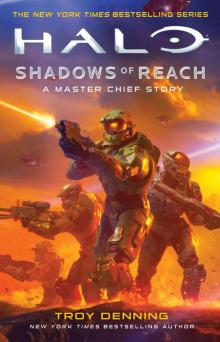 Shadows of Reach: A Master Chief Story
Shadows of Reach: A Master Chief Story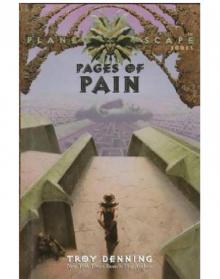 Pages of Pain p-1
Pages of Pain p-1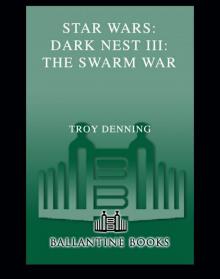 Star Wars 396 - The Dark Nest Trilogy III - The Swarm War
Star Wars 396 - The Dark Nest Trilogy III - The Swarm War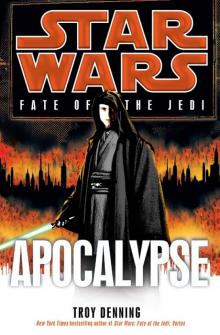 Star Wars: Fate of the Jedi: Apocalypse
Star Wars: Fate of the Jedi: Apocalypse A Forest Apart
A Forest Apart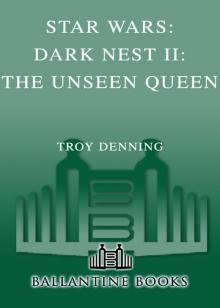 Star Wars: Dark Nest II: The Unseen Queen
Star Wars: Dark Nest II: The Unseen Queen Star Wars: A Forest Apart
Star Wars: A Forest Apart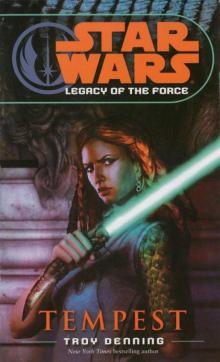 Tempest: Star Wars (Legacy of the Force) (Star Wars: Legacy of the Force)
Tempest: Star Wars (Legacy of the Force) (Star Wars: Legacy of the Force)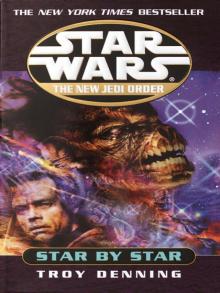 Star by Star
Star by Star Crucible: Star Wars
Crucible: Star Wars Last Light
Last Light Invincible
Invincible Inferno
Inferno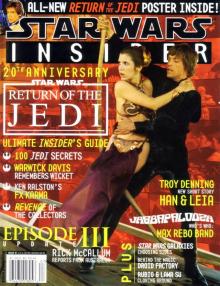 Star Wars - The Trouble With Squibs
Star Wars - The Trouble With Squibs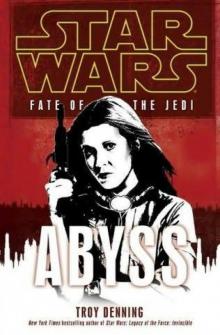 Abyss
Abyss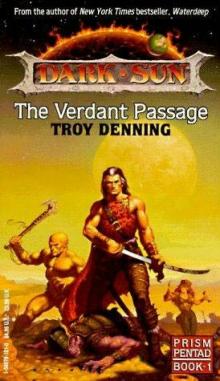 The Verdent Passage
The Verdent Passage Vortex: Star Wars (Fate of the Jedi) (Star Wars: Fate of the Jedi)
Vortex: Star Wars (Fate of the Jedi) (Star Wars: Fate of the Jedi)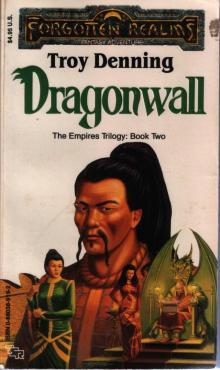 Dragonwall e-2
Dragonwall e-2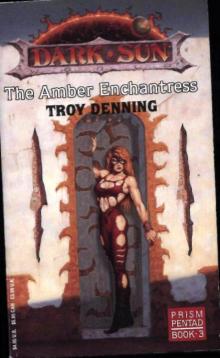 The Amber Enchantress
The Amber Enchantress Crucible
Crucible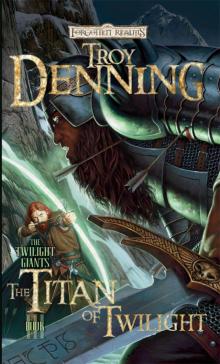 The Titan of Twilight
The Titan of Twilight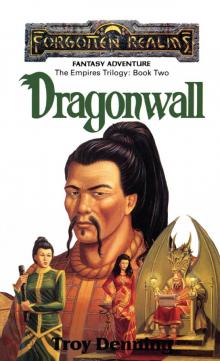 Dragonwall
Dragonwall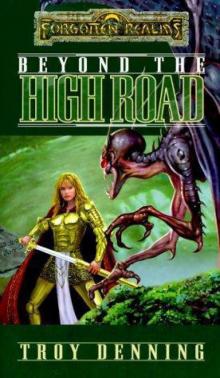 Beyond the High Road c-2
Beyond the High Road c-2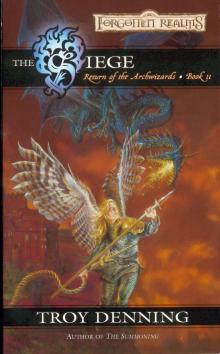 The Siege rota-2
The Siege rota-2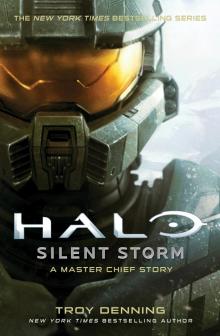 Silent Storm: A Master Chief Story
Silent Storm: A Master Chief Story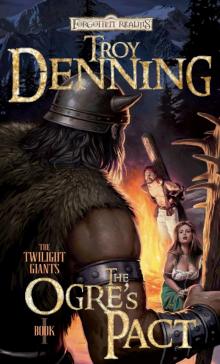 The Ogre's Pact
The Ogre's Pact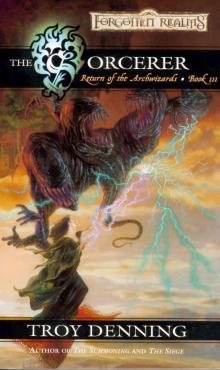 The Sorcerer rota-3
The Sorcerer rota-3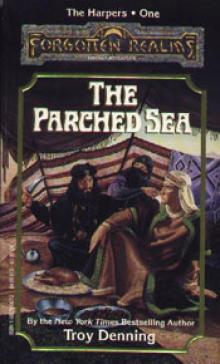 The Parched sea h-1
The Parched sea h-1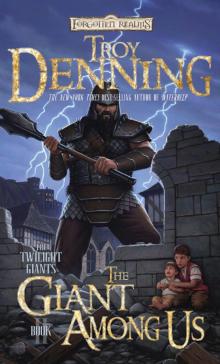 The Giant Among Us
The Giant Among Us Recovery
Recovery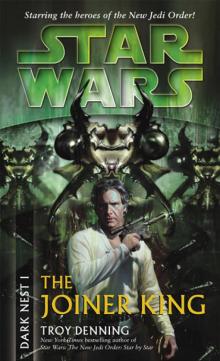 Star Wars: Dark Nest 1: The Joiner King
Star Wars: Dark Nest 1: The Joiner King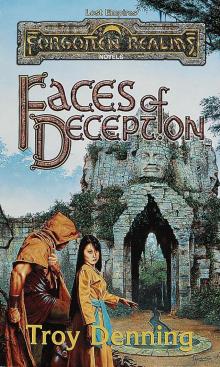 Faces of Deception le-2
Faces of Deception le-2 The Parched Sea
The Parched Sea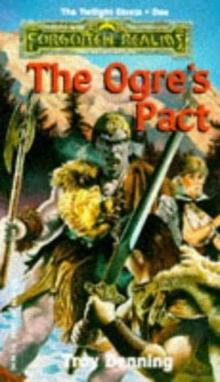 The Ogre's Pact зк-1
The Ogre's Pact зк-1 Apocalypse
Apocalypse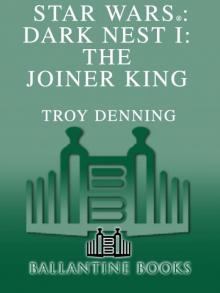 Star Wars®: Dark Nest I: The Joiner King
Star Wars®: Dark Nest I: The Joiner King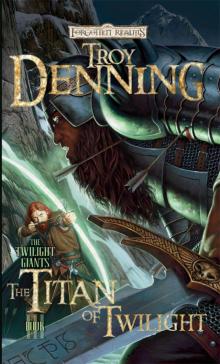 The Titan of Twilight ttg-3
The Titan of Twilight ttg-3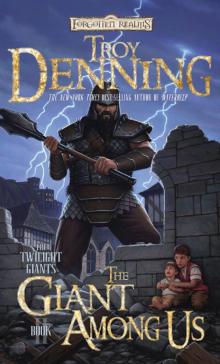 The Giant Among Us ttg-2
The Giant Among Us ttg-2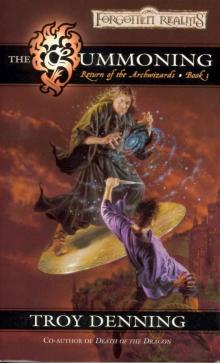 The Summoning rota-1
The Summoning rota-1 Tatooine Ghost
Tatooine Ghost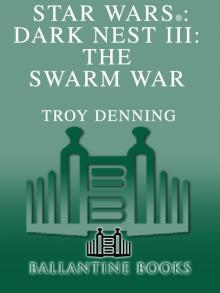 Star Wars®: Dark Nest III: The Swarm War
Star Wars®: Dark Nest III: The Swarm War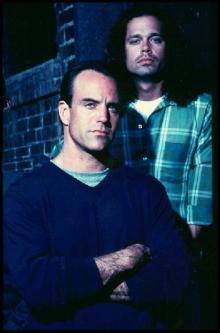 Retribution
Retribution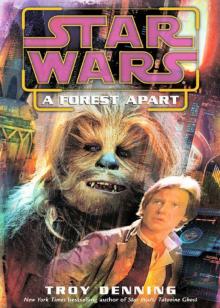 A Forest Apart: Star Wars (Short Story)
A Forest Apart: Star Wars (Short Story)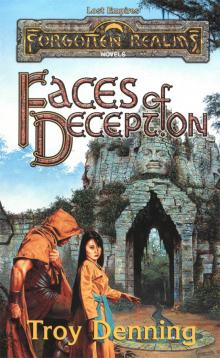 Faces of Deception
Faces of Deception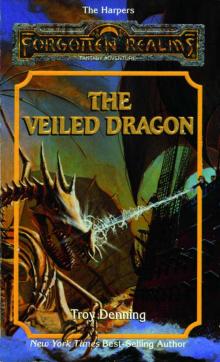 The Veiled Dragon h-12
The Veiled Dragon h-12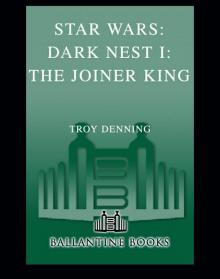 Star Wars 390 - The Dark Nest Trilogy I - The Joiner King
Star Wars 390 - The Dark Nest Trilogy I - The Joiner King Waterdeep
Waterdeep STAR WARS: NEW JEDI ORDER: RECOVERY
STAR WARS: NEW JEDI ORDER: RECOVERY